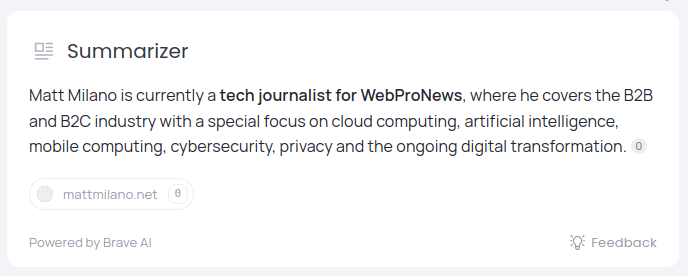Brave Search has unveiled its latest feature, the AI-powered Summarizer, which is designed to give users quick answers.
Microsoft Bing may be getting much of the news coverage for AI-powered search, but Brave is a popular, privacy-focused search engine that is also integrating AI capabilities. The company’s Summarizer tool is designed to give users “concise and to-the-point answers at the top of Brave Search results pages.”
Best known for its Brave web browser, the company acquired the open search engine Tailcat in early 2021 and used it as the basis for its Brave Search. The company’s search engine is unique in that it is one of the few independent search engines that has its own web index. In contrast, many other independent search engines use Google or Bing and strip out those companies’ trackers.
Read more: Brave Search Enters Public Beta
I personally am a big fan of Brave Search, using it more times than I can count throughout the day. While it’s not perfect, I find Brave to provide more relevant results than either Google or Bing in many categories.
The Summarizer began showing up at the top of Brave searches on March 2. In just the last few days, I’ve come to rely on the feature more and more, especially when looking for quick answers.
For example, searching for “best Linux text editor” produces this answer:

Asking “what is WebProNews” results in:

Just for laughs, I even asked, “who is matt milano tech journalist,” and received this:

At least Summarizer didn’t confuse me with a certain NFL player…
As the company points out and is evident in the above screenshots, Brave’s Summarizer is designed to provide authoritative answers, even backing them up with sources. The company emphasizes this advantage in its blog:
Unlike a purely generative AI model, which is prone to spout unsubstantiated assertions, we trained our large language models (LLMs) to process multiple sources of information present on the Web. This produces a more concise, accurate answer, expressed in coherent language.
In addition, the provenance of original sources of data is cited at all times via links. This maintains the rightful attribution of information, and helps users assess the trustworthiness of the sources, both of which are needed to mitigate the authority biases of large language models.
It’s clear from Brave’s approach that the company does not believe in relying solely on AI for answers but believes it should be used responsibly, in combination with “critical thinking.”
Using Web results enables the Summarizer to provide real-time information that is up to date with today’s events. Given the current advancements in AI, it’s crucial to remind users that one should not believe everything an AI system produces, in much the same way one should not believe everything that is published on the Web. At the risk of stating the obvious, we should not suspend critical thinking for anything we consume, no matter how impressive the results of AI models can be.
“With 22 million queries per day, Brave Search is the fastest growing search engine since Bing. We provide independent search results from our own index of the Web, and today we’re further improving the relevance of those results with our AI-powered Summarizer,” said Josep M. Pujol, Chief of Search at Brave. “Unlike AI chat tools which can provide fabricated responses, the Summarizer generates a plain-written summary at the top of the search results page, aggregating the latest sources on the Web and providing source attribution for transparency and accountability. This open system is available to all Brave Search users today to help them better navigate search results.”
Overall, I’m impressed with Brave’s implementation and will continue to rely heavily on it. Hopefully, the company will continue to evolve and improve it even more. In the meantime, all users can try it out without joining a waitlist.




 WebProNews is an iEntry Publication
WebProNews is an iEntry Publication